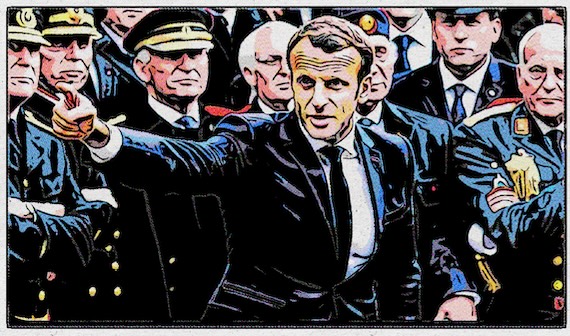By Imran Khalid | –
( Foreign Policy in Focus ) – It took nearly a year for French President Emmanuel Macron to confront the uncomfortable truth: the path to peace in Gaza cannot be paved with more weapons to Israel. His recent remarks, sharp and unapologetic, reflected the urgency of shifting away from military escalation. “I think that today, the priority is that we return to a political solution, that we stop delivering weapons to fight in Gaza,” Macron declared, laying bare his stance. He was unequivocal in his message, adding, “If you call for a ceasefire, it’s only consistent that you do not supply weapons of war.”
Although Macron clarified that France does not supply Israel with offensive arms, his pointed comments seemed aimed at the United States, which remains Israel’s primary arms provider. Washington and other European countries, despite acknowledging that these weapons have been used against civilians, continues to send shipments, fueling a conflict in Gaza that has already claimed more than 42,000 lives. Macron’s statement contributes to an ongoing shift in Europe’s approach that challenges the long-standing, uncritical support for Israel’s military actions.
Israeli leader Benjamin Netanyahu, visibly agitated by Macron’s remarks, fired back with a familiar rhetoric of defense, invoking Israel’s right to self-protection. “As Israel fights the forces of barbarism led by Iran, all civilized nations should stand by us,” Netanyahu declared, calling Macron’s stance “a disgrace.” In a video addressed directly to the French president, Netanyahu doubled down, stating, “Israel will win with or without their support. But their shame will linger long after this war is over.”
His remarks underscore the widening rift between Israel and some of its traditional Western allies as the conflict escalates. Yet, the undercurrent of this diplomatic quarrel suggests something far more significant than a routine policy disagreement. Macron’s hesitation to unconditionally support Israel—despite the West’s long-standing alignment with its security needs—indicates a growing recognition among European leaders that Israel’s operations have surpassed legitimate self-defense and entered the realm of excessive, unchecked aggression.
As the violence grinds on, Macron’s call for a political solution reflects an emerging European discomfort with the status quo. The question now is whether Macron’s bluntness will push other leaders, especially in the United States and Germany, to reconsider their own complicity in fueling this relentless cycle of violence. For years, European nations have trod lightly around Israel’s military actions, particularly in its volatile engagements with Palestinian territories. But more European capitals are now witnessing massive protests against Israel, indicating increasingly discomfort in Europe with Netanyahu’s expansionist approach to the conflict, which is designed to shore up his domestic political survival rather than achieve long-term security.
“J’accuse,” Digital, Dream / Dreamland v3 / Clip2Comic, 2024
Netanyahu’s heated response to Macron is particularly notable for its timing: October 7. The anniversary of the devastating violence that ignited yet another round of suffering for both Israelis and Palestinians should be a day of solemn reflection, yet Netanyahu has used it to double down on his military offensives on all sides of Israeli borders. Instead of working toward a resolution, his government has opted for broader assaults, widening the conflict, and targeting civilian infrastructure in a way that has drawn mounting international condemnation.
At the heart of Netanyahu’s strategy lies a grim reality: his political survival hinges on perpetuating conflict. Under intense scrutiny for his domestic failures and facing an increasingly fractured political landscape at home, Netanyahu has leaned into a hawkish narrative to rally support from his far-right base. By stoking fear and framing Israel as under siege, Netanyahu has stifled criticism from within his own country while marginalizing voices calling for a peaceful resolution.
Netanyahu’s war is not about elections or the protection of Israeli citizens. It is about staying in power. Expanding the conflict offers him a chance to maintain his political grip, even as international sentiment shifts uneasily away from unconditional support for Israel. Netanyahu’s actions have raised serious concerns about war crimes, particularly in light of Israel’s reported strikes on civilian areas and humanitarian corridors. Although Israel claims its right to target Hamas militants, the disproportionate toll on Palestinian civilians has been impossible to ignore. Hospitals, schools, and densely populated neighborhoods have been devastated, with little regard for international law or the principles of proportionality.
European nations, including France, have historically turned a blind eye to such violations, framing them as unfortunate but necessary casualties of war. But as the conflict drags on, Macron’s diplomatic distancing could mark the beginning of a broader shift in Europe’s stance toward Israel’s military campaigns. As the death toll rises in Gaza, West Bank and Lebanon and the international community grows more aware of the scale of the destruction, Netanyahu’s gamble may yet backfire. His attempt to expand the conflict for personal gain could result in the very political isolation he is desperate to avoid.



 © 2025 All Rights Reserved
© 2025 All Rights Reserved